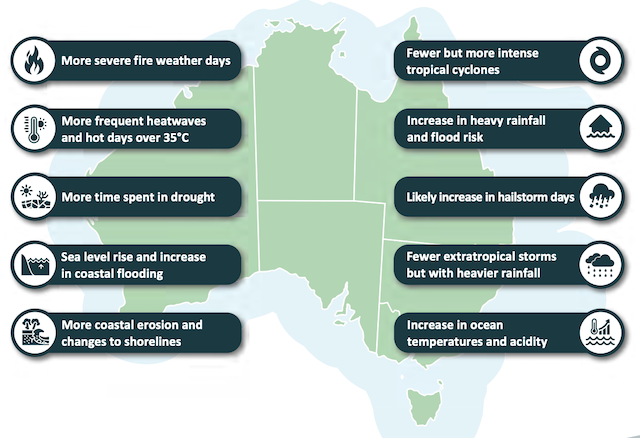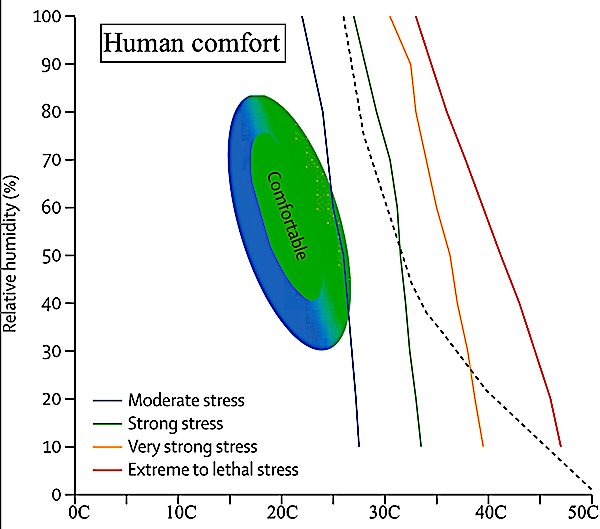Search
Recent comments
- escalationing....
2 min 23 sec ago - not happy, john....
4 hours 21 min ago - corrupt....
9 hours 43 min ago - laughing....
11 hours 37 min ago - meanwhile....
13 hours 5 min ago - a long day....
15 hours 8 sec ago - pressure....
15 hours 47 min ago - peer pressure....
1 day 7 hours ago - strike back....
1 day 7 hours ago - israel paid....
1 day 8 hours ago
Democracy Links
Member's Off-site Blogs
warming up faster than expected, despite the sceptics....
https://www.youtube.com/watch?v=CHJKKsOHtAk
Why were climate models so wrong about 2023? Neil deGrasse Tyson learns about why 2023 was hotter than we expected it to be and what effects need to be factored into future climate modeling with climatologist at NASA Goddard Institute, Gavin Schmidt.
How 2023 Broke Our Climate Models with Neil deGrasse Tyson & Gavin Schmidt
--------------
Australia is conducting its first climate risk assessment and developing an adaptation plan. Not only humans experience heat stress, so do other animals and plants. If you must feed wild birds, listen to the experts’ tips.
Assessing Australia’s climate risks
The Commonwealth Department of Climate Change, Energy, the Environment and Water (DCCEEW) has released the National Climate Risk Assessment. First pass assessment report. Before considering the contents of the report, it should be noted that:
- DCCEEW claims that this is ‘Australia’s first National Climate Risk Assessment’. I suppose that if you capitalise National Climate Risk Assessment, that may be strictly true. But if you remove the capitals, this is not the first assessment of risks posed by climate change to Australia. That honour goes to a report that Anthony Albanese asked the Office of National Intelligence to prepare soon after coming to office, and in line with an election promise, that examined security threats posed by global heating. The report was completed last year but despite pressure from the Greens in parliament, Albanese has refused to release it. Maybe he’s worried it will give China’s National Meteorological Administration some information they can use against us next time we have a cyclone.
- The subtitle, ‘First pass assessment report’, indicates that following this rapid risk assessment a more in-depth, ‘second pass’ risk assessment is now underway and due to be completed later in 2024.
The purpose of the whole assessment is to ‘help governments, industry and communities prepare for, adapt to, and mitigate risks from a more challenging climate’. Credit here to the Albanese government for (1) initiating what should have been started about twenty years ago and regularly updated since, (2) accepting that climate change will continue to exacerbate risks (even after we reach zero emissions), and (3) focusing on the ten priority hazards projected by the Bureau of Meteorology to worsen in coming decades:

To assess the risks, the report considers low and high emissions scenarios leading to average global warming of 1.5oC and 2oC in 2050 and 2oC and 3oC in 2090, recognising that temperatures around Australia are likely to be higher than the global average.
The first pass report discusses 56 nationally significant climate risks across seven systems (security, economy, health, infrastructure and built environment, natural environment, primary industries, regional communities). The report on an eighth system, First Nations values and knowledges, is not yet complete.
For the second risk assessment, 11 of the 56 risks have been prioritised for detailed consideration in both 2050 and 2090. Four of the 11 are recognised to be cross-system risks and the second pass will ‘explore complex risk and cross-system dependencies’. This sounds good but I was disappointed not to see any mention of using the concepts and methods of complex systems thinking in the second phase and the adaptation plan. Experience tells me that government and private sector managers tend to think of systems in terms of bureaucratic departments, hierarchical organisation charts and protection of their own empires. Exploring cross-system problems usually involves establishing an interdepartmental working group that meets for a year and then peters out.
The challenges we face in Australia and globally from climate change (and not only climate change) require an appreciation of self-organising natural systems, the components of which are interdependent and continuously influencing each other, and other systems, in complex, often unpredictable, ways. Concepts and tools are available to help people understand, analyse, work in and change such systems and it would be nice to see the government adopt such a systemic approach to managing climate change.
A detailed National Climate Risk Assessment report will be released on completion of the second pass assessment. This will inform a National Adaptation Plan to ‘reduce climate risk and ensure Australia can continue to prosper in an increasingly climate-disrupted future’. If you’d like to make a submission to the Issues Paper for the Adaptation Plan, you’d better get your skates on as the consultation period finishes on April 11th.
What is telling about the assessment report and issues paper is that the government clearly understands the underlying problem and the serious risks posed to Australia by climate change. Also, that they have a pretty good idea already of what needs to be done to manage as best we can the inevitable consequences.
I think it’s fair to assume that they also know what needs to be done to tackle the fundamental causes of climate change. What they seem as incapable as their predecessors of doing is take real action to reduce and eliminate greenhouse gas emissions. Albanese and colleagues are an enormous disappointment in this regard.
Temperature thresholds of life
Currently, about 35% of the global population is chronically stressed by heat. This is projected to increase to 45-75% this century. Over a similar period, the area of global land affected by deadly climate conditions will increase from 12% to 45-70%.
A comfortable temperature range for humans is 17-24oC, lower when relative humidity is high, higher when it’s low, but it is also dependent on many personal and local factors and the duration of exposure. At very high humidity and 31oC, an exposure time of six hours can be dangerous.
The figure below shows the comfortable range for humans and how heat stress increases as the temperature increases, reaching potentially lethal levels at 30-45oC depending on the humidity. As a rule of thumb, the level of stress jumps up a notch for every 5oC increase in temperature above 25oC. In essence, the levels of temperature, humidity, wind and radiation and the frequency and duration of heat waves are the significant environmental influences on heat stress in humans.

It’s not only humans who suffer. Heat stress causes reduced growth of farm animals resulting in lower yields and reproductivity, and death at very high temperatures. Not surprisingly considering our common ancestry, the comfort ranges for cattle, pigs and poultry are similar to humans. Many of us also remember the two-day heatwave in November 2019 that killed 23,000 spectacled flying foxes (a third of the Australian population) in northern Queensland.
Nor is it only animals that are affected by heat. Single events of extreme heat can, of course, devastate crops but prolonged heat stress is also harmful. In a field experiment involving irrigation and artificial heating, the wheat yield decreased steadily once the average temperature of the growing season exceeded 18oC, with complete crop failure at 29oC.
https://johnmenadue.com/environment-australia-publishes-its-first-climate-risk-assessment/
----------------
Swedish climate activist Greta Thunberg has padded her arrest record at a protest in the Netherlands, reportedly being detained twice by police after she helped block roads near the Dutch parliament.
The incidents occurred on Saturday, when a large crowd of Extinction Rebellion demonstrators tried to block the A12 highway in The Hague. A heavy police presence, including officers on horseback, prevented the activists from tying up the highway, but a small group broke away and sat down on a main road.
The 21-year-old Thunberg was among those protestors, and a clip posted on social media shows two police picking her up by the arms and carrying her to a bus filled with other detained people. Reutersreported that Thunberg was held for a short time before being released, and she then was detained again after joining a group blocking a road leading to the railway station.
https://www.rt.com/news/595532-greta-thunberg-arrested-at-dutch-protest/
it's time for being earnest.....
- By Gus Leonisky at 7 Apr 2024 - 11:19am
- Gus Leonisky's blog
- Login or register to post comments

living standards?....
HERE FOLLOWS A SEMI-VACUOUS DISCUSSION BY JOHN ANDERSON AND KONSTANTIN KISIN THAT DOS NOT SOLVE ANYTHING BUT CONTRIBUTES TO THE SILLINESS OF IGNORANT DEBATE... LIVING STANDARDS ARE IMPORTANT. BUT, SHOULD GOBLA WARMING START IN EARNEST AND IT WILL, WE NEED TO MAKE ADJUSTMENTS TO THE WAY WE ACHIEVE LIVING STANDARDS... OF COURSE JOHN ANDERSON, THE CONSERVATIVE FORMER AUSTRALIAN DEPUTY PM, PRAISES THE AMERICAN LEADERSHIP IN DEVELOPING ... SOMETHING.
AMERICA HAS BEEN AT THE BURNING COAL/OILY FACE OF GLOBAL WARMING AND STILL IS... AUSTRALIA, PER CAPITA, CONTRIBUTES MORE TO GLOBAL WARMING THAN ANY OTHER NATIONS... AND YES, THE POOR NATIONS WILL WANT TO REDUCE POVERTY. CHINA HAS ACHEIVED A MIRACLE AND WILL CONTINUE TO DO SO... AS A COUNTRY, IT CONTRIBUTES THE MOST OF GLOBAL WARMING GASES. PER CAPITA, CHINA PRODUCES ABOUT 4 TIMES LESS EMISSIONS THAN AUSTRALIA. GO FIGURE...
WE KNEW OF THE ANTHROPOGENIC GLOBAL WARMING PROBLEM BACK IN THE 1970s... APART FROM A FEW PEOPLE DANCING WITH FEATHERS IN THEIR BUTT, NO-ONE PAID ATTENTION, LEAST THE OIL MERCHANTS.
FOR MANY PEOPLE, THE STANDARDS OF LIVING WERE KAPUTED BY AMERICA WAGING WARS... WARS ARE GLOBAL WARMING STUFF. THE WEST SHOULD STOP ARMING YUCKRAINE, SO THE PAIN CAN STOP FOR ALL INVOLVED... SO WHAT? PUTIN GETS HIS WISHES?... WHAT'S THE PROBLEM? NATO NEEDS NAPPIES?.
GLOBAL WARMING WON'T STOP OVERNIGHT... ACCORDING TO GUS'S CALCULATIONS 2032 WILL BE WHEN THE SHIT HITS THE FAN... AND IT WILL CONTINUE TO DO SO FOR ANOTHER 1000 YEARS... YOUR STANDARDS OF LIVING WILL TAKE A HIT NO MATTER WHAT... THESE WILL BE THE LEAST OF HUMANITY'S CONCERN: SURVIVAL WILL BE FROM SAY 2100 ONWARDS... IN A VERY UNCOMFORTABLE WORLD.
https://www.youtube.com/watch?v=0WQCGvNp2K4
The biggest problem with Climate Change | Konstantin KisinJohn and Konstantin discuss the lies that are being told about how best to combat climate change and what the consequences of those lies are.
Raised in the Soviet Union, Konstantin is not persuaded by leftist visions of utopia, and exhorts reasonable people to speak out against the 'woke mob'. He also argues that multiculturalism should be rebranded as multi-ethnic societies with a 'monoculture', uniting everyone from different backgrounds.
Konstantin Kisin is a writer, social commentator, comedian, and co-host of the free speech podcast Triggernometry. He is a regular on British and American TV and radio shows including Question Time, Good Morning Britain, BBC Breakfast, Daily Politics, LBC Cross Question, Tucker Carlson, the Megyn Kelly Show, and many others.
Konstantin has written for publications including the Daily Telegraph, the Spectator, Tablet Magazine, Quillette, and Standpoint as well as his first book, An Immigrant’s Love Letter to the West. More recently, he spoke at the inaugural Alliance for Responsible Citizenship Conference in London, England.
Conversations feature John Anderson, former Deputy Prime Minister of Australia, interviewing the world's foremost thought leaders about today's pressing social, cultural and political issues.
John believes proper, robust dialogue is necessary if we are to maintain our social strength and cohesion. As he puts it; "You cannot get good public policy out of a bad public debate."
GUSNOTE: THIS CONVERSATION IS GLIB AND SELF-SERVING WITH LITTLE SUBSTANCE...
SEE ALSO (POSTED IN 2007): https://yourdemocracy.net/drupal/node/4446
(POSTED IN 2017): https://yourdemocracy.net/drupal/node/33287
READ FROM TOP.
it's time for being earnest.....more f%$ked than the rest of you....
https://www.youtube.com/watch?v=uGDnkq_KeTA
Europe is cooking at double speed! Are Europeans ready?READ FROM TOP.
it's time for being earnest.....